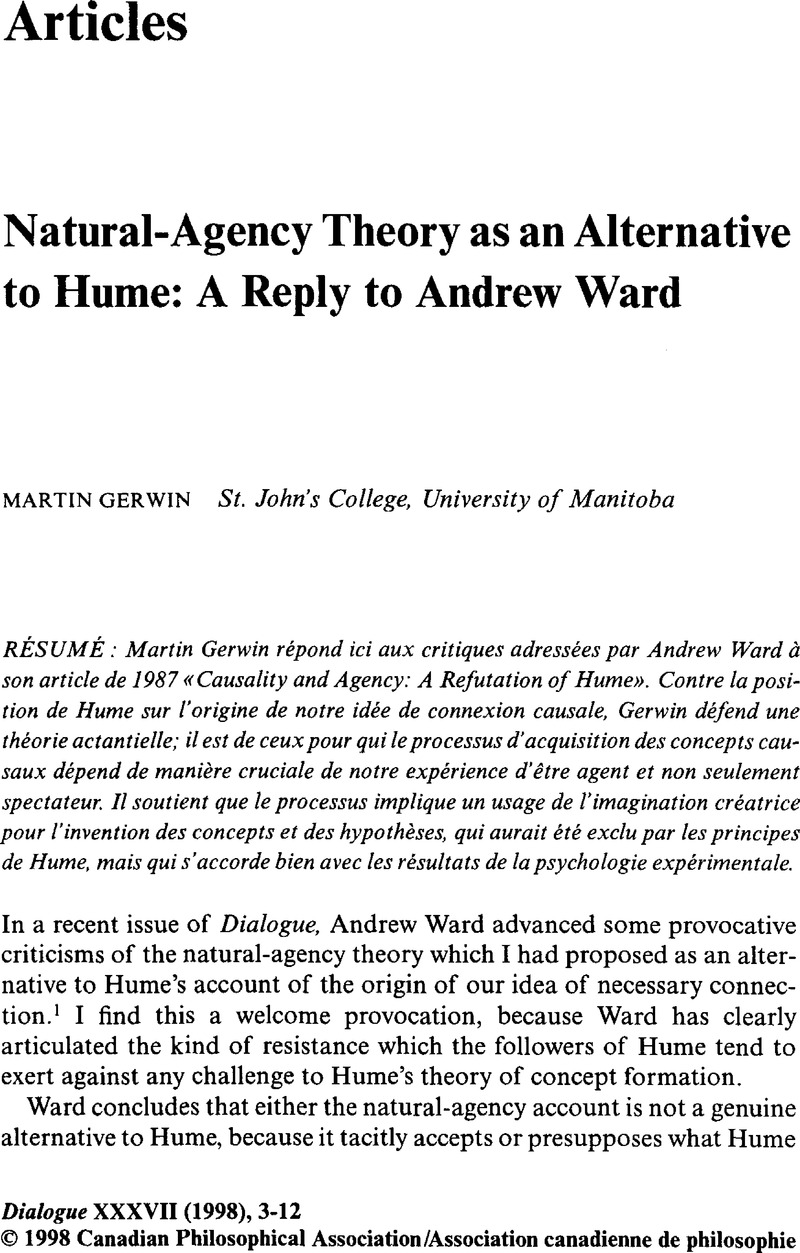No CrossRef data available.
Published online by Cambridge University Press: 13 April 2010

1 Ward, Andrew, “Is Gerwin's Natural-Agency Theory a Viable Alternative to Hume?” Dialogue 33 (1994): 733–42CrossRefGoogle Scholar. The natural-agency theory was advanced in Martin Gerwin, “Causality and Agency: A Refutation of Hume,” Dialogue 26 (1987): 3–17Google Scholar.
2 Hume, David, A Treatise of Human Nature, edited by Selby-Bigge, L. A. (Oxford: Clarendon Press, 1888), p. 163Google Scholar. Cf. Hume, David, An Enquiry Concerning Human Understanding, edited by Selby-Bigge, L. A. (Oxford: Clarendon Press, 1902), p. 78Google Scholar.
3 Hume, , Treatise, p. 171Google Scholar.
4 Ibid., p. 165; cf. Hume, , Enquiry, pp. 73–76Google Scholar.
5 Ward, , “Gerwin's Natural-Agency Theory,” pp. 734, 738Google Scholar.
6 Ibid., p. 735.
7 Ibid., pp. 734-35.
8 Hume, , Treatise, p. 157;Google Scholar cf. Hume, , Enquiry, p. 64Google Scholar n.
9 Hume, , Treatise, Appendix, pp. 632–33;Google Scholar cf. Hume, , Enquiry, pp. 62–67Google Scholar. See Locke, John, An Essay Concerning Human Understanding, edited by Fraser, Alexander Campbell (Oxford University Press, 1894; rpt. New York: Dover Books, 1959), Book 2, chap. 22, esp. Vol. 1, pp. 313-14Google Scholar.
10 Flew, Antony, “Can an Effect Precede its Cause?” Proceedings of the Aristotelian Society, Suppl. Vol. 28 (1954): 49Google Scholar. A more recent expression of this line of criticism may be found in Flew's essay “The Legitimation of Factual Necessity,” in Faith, Scepticism and Personal Identity, edited by MacIntosh, J. J. and Meynell, H. A. (Calgary: University of Calgary Press, 1994), pp. 101–17, esp. p. 108Google Scholar.
11 Collingwood, R. G., “On the So-called Idea of Causation”, Proceedings of the Aristotelian Society 38 (1937–38): 93–94Google Scholar.
12 Reid, Thomas, Essays on the Active Powers of the Human Mind (Cambridge, MA: MIT Press, 1969), p. 270; see also p. 36Google Scholar.
13 Biran, Pierre Maine de, Œuvres de Maine de Biran, edited by Tisserand, P., 14 vols. (Paris, 1920–42), Tome 8, p. 195Google Scholar; Tome 11, pp. 350-51. For a helpful secondary source, see Hallie, Philip P., Maine de Biran, Reformer of Empiricism (Cambridge, MA: Harvard University Press, 1959), esp. chap. 2CrossRefGoogle Scholar.
14 Ward, , “Gerwin's Natural-Agency Theory,” p. 737Google Scholar.
15 Ibid.
16 Ibid., pp. 737-38.
17 Piaget, Jean, The Child's Conception of the World, translated by Joan, and Tomlinson, Andrew (London: Routledge & Kegan Paul, 1929), chap. 5Google Scholar.
18 Ward, , “Gerwin's Natural-Agency Theory,” p. 739Google Scholar.
19 Ibid.
20 Ibid.
21 Piaget, Jean, The Child's Construction of Reality, translated by Cook, Margaret (London: Routledge & Kegan Paul, 1955), p. 225Google Scholar.